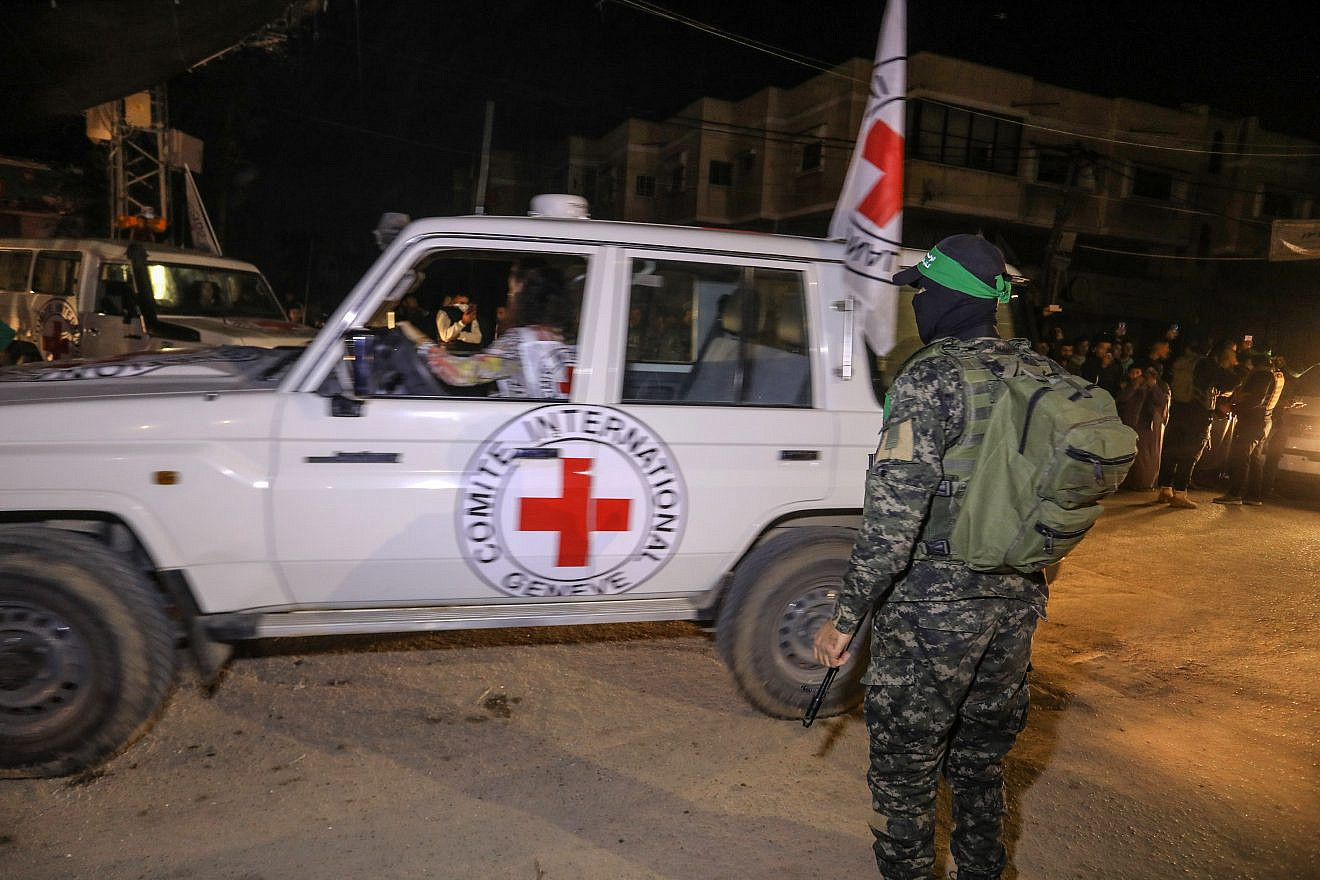Hamas released another group of Israeli hostages on Wednesday evening, 54 days after they were taken to the Gaza Strip during the terror group’s Oct. 7 massive assault on southwestern Israel.
The hostages were handed over by Hamas terrorists to representatives of the International Committee of the Red Cross in Gaza before returning to Israeli territory.
Israeli Prime Minister Benjamin Netanyahu’s office identified the Israelis freed on Wednesday night as Raz Ben-Ami, 57; Raya Rotem, 54; Liat Atzili, 49; Moran Stela Yanai, 40; Yarden Roman, 35; Liam Or, 18; Itay Regev, 18; Ofir Engel, 18; Amit Shani, 16; and Gali Tarshansky, 13.
A spokesperson for the Qatari Foreign Ministry said that the group included five minors, including one dual Israeli-Dutch citizen, and five women, including one American and three German nationals.
During an earlier handover on Wednesday evening, Hamas freed two Israeli women with dual Russian citizenship—”extra” captives who were released as a gesture of “appreciation” to President Vladimir Putin.
Jerusalem named the two as Lena Trupanob, 50, and her 73-year-old mother, Irena Tati. Trupanob appeared in a propaganda video released by Hamas on Oct. 30, alongside two other Israeli women who were released as part of earlier waves.
Hamas on Wednesday also freed four Thai nationals as part of a side deal with Bangkok, Doha said in a statement.
ילנה ואירנה שבו לישראל: תיעוד – המונים מקיפים אותן בהעברה מידי חמאס לצלב האדום@gal_sade pic.twitter.com/GF0auXOJsd
— כאן חדשות (@kann_news) November 29, 2023
‘Ready for the next stage’
A total of 73 Israelis have been freed since the initial four-day ceasefire started on Friday morning, along with 23 Thais and one Filipino.
Hamas agreed on Monday to release 10 hostages per day as part of the Qatar-brokered extension, which could last up to six days total before the IDF’s military operation against the terror group resumes.
Israel has agreed to release three Palestinian security prisoners for each Israeli hostage as part of the deal, which also includes the entry of additional humanitarian aid and fuel into the Strip.
Among the prisoners slated to be released on Wednesday was Palestinian activist Ahed Tamimi, who was detained earlier this month on charges of inciting terrorism after she called for the murder of Jewish residents of Judea and Samaria.
Hamas kidnapped some 240 people during its Oct. 7 murder spree in southern Israel, during which thousands of gunmen murdered some 1,200 people and wounded more than 5,000 others.
Approximately 149 Israelis and foreigners are still in Hamas captivity, including Kfir Bibas, who was 9 months old when he was taken hostage on Oct. 7 along with his parents and 4-year-old brother Ariel.
Earlier on Wednesday, the “military” wing of Hamas announced the deaths of Kfir, Ariel and their mother, Shiri, 32, the Hamas- and Palestinian Islamic Jihad-affiliated Quds News Network reported.
The Al-Qassam Brigades did not present evidence to back up its claims, and the IDF said it was investigating.
As part of the initial ceasefire agreement, Hamas agreed to allow representatives of the Red Cross to visit the remaining hostages and provide medical assistance to those who need it.
On Wednesday, CNN cited multiple sources as saying that Red Cross officials have not yet been allowed to visit any of the captives in Gaza.
During a call with Red Cross president Mirjana Spoljaric Egger on Tuesday, U.S. National Security Adviser Jake Sullivan stressed the need for the organization to visit the hostages that remain in Gaza.
Sullivan “reiterated the call for the immediate release of all hostages, and highlighted the imperative need for the ICRC to have access to and provide medical assistance to those hostages still being detained,” according to a White House readout published on Wednesday.
A spokesperson for Qatar’s foreign ministry told CNN on Wednesday that negotiations were “moving towards” an agreement that would also see Israeli men taken hostage by Hamas released.
“Our negotiations regarding women and children take paramount position within the discussions, but obviously we are moving toward civilian men being released,” said spokesman Majed Al-Ansari.
He claimed that negotiations are also being held on the potential release of abducted IDF soldiers and the prospect of a “longer truce” that could “lead to a ceasefire.”
Meanwhile, IDF Chief of Staff Lt. Gen. Herzi Halevi approved battle plans for after the ceasefire during a meeting at the Southern Command headquarters in Beersheva on Wednesday, the military said.
“We know what needs to be done, and are ready for the next stage,” said Halevi, according to the statement.


























